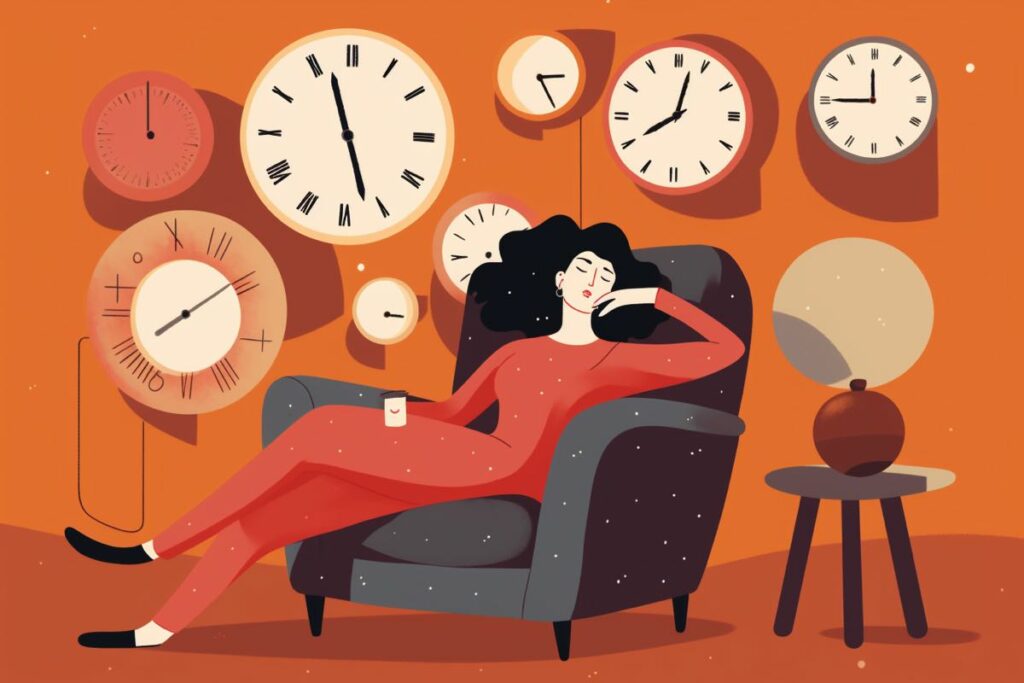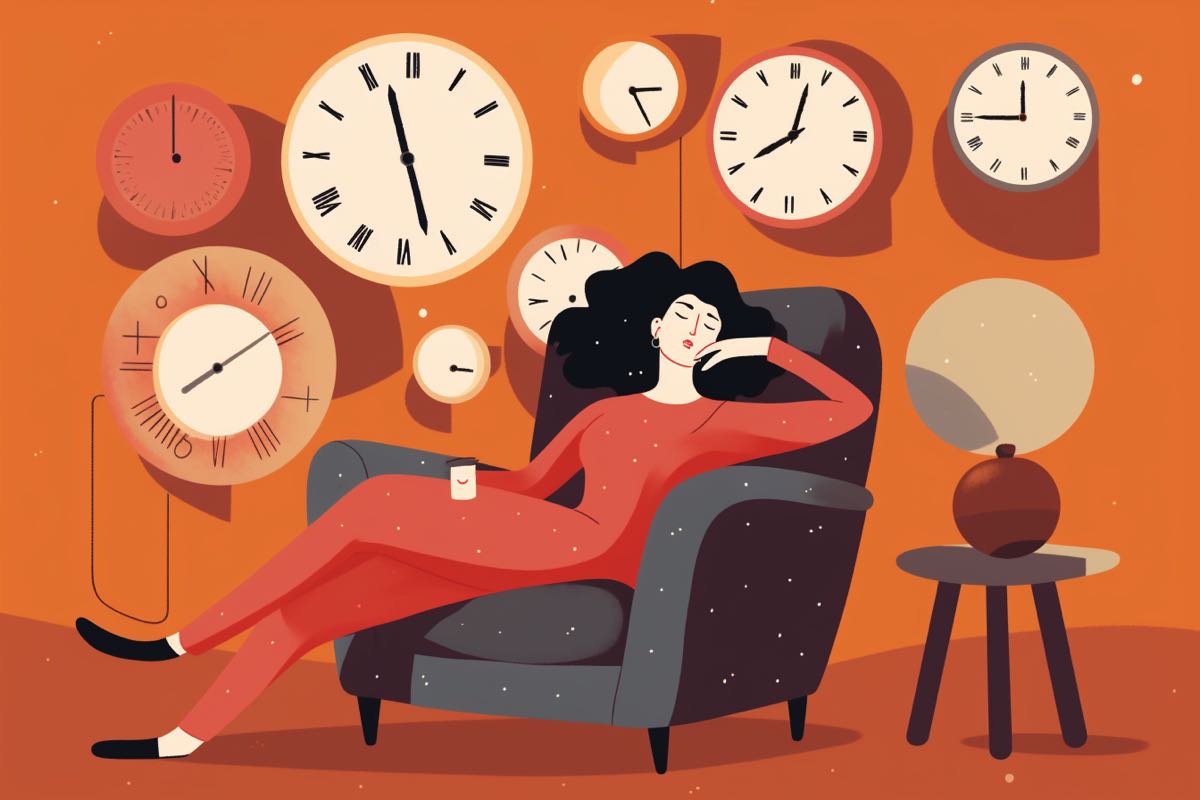We’ve all been there – that midday slump hits, and you can hardly keep your eyes open. You know a power nap is in order, but how long should it be to reap the maximum benefits without feeling groggy afterward?
As someone who absolutely loves sleep and values its restorative properties, I’ve done my fair share of research on this topic. It’s crucial to understand the science behind napping and what duration works best for our bodies.

First things first, let me tell you that I’m a firm believer in the power of naps. They’re like mini-holidays for your brain! Naps aren’t just an indulgence; they’re actually a great way to recharge and improve productivity throughout the day.
But here’s the catch – not all naps are created equal, and their effectiveness largely depends on their length. In this article, we’ll dive into the sweet spot for power napping that’ll leave you refreshed and ready to tackle the rest of your day with gusto!
Benefits Of Power Napping
Power napping is like hitting the refresh button on your brain; it’s a quick and effective way to recharge and rejuvenate yourself during the day.
In our fast-paced lives, we often rely on caffeine consumption to help us stay alert and focused, but power naps can be a healthier alternative. By taking a brief nap, you’re allowing your body to rest and recuperate, which can boost your energy levels, improve your cognitive function, and enhance your overall performance – all without reaching for that extra cup of coffee.
One of the key benefits of power napping is its role in stress management. When you take a short break to catch some Zs, you’re giving yourself an opportunity to disconnect from the hustle and bustle of daily life.
This temporary disengagement can help lower stress levels by providing much-needed relaxation for both mind and body. So next time you feel overwhelmed or sluggish during the day, consider treating yourself to a power nap instead of another dose of caffeine – your mind, body, and soul will thank you for it.
Understanding The Science Behind Napping
So, let’s dive into the wonderful world of napping! It’s incredible how recharging energy and boosting brain development can be achieved by simply taking a short snooze during the day.
When we nap, our bodies have a chance to repair and rejuvenate, allowing us to tackle the rest of our day with renewed vigor. Plus, it’s a fantastic way to give our brains a much-needed break from constant stimulation.
The science behind napping is truly fascinating. Studies have shown that power naps lasting between 10 and 20 minutes are ideal for maximizing the benefits of daytime sleep. This brief window allows us to experience light sleep stages without entering deep sleep, which can actually leave us feeling groggy instead of refreshed if we’re woken up suddenly.
So next time you’re in need of a little pick-me-up during the day, don’t hesitate to indulge in a power nap – you’ll thank yourself later when you’re feeling energized and ready to conquer whatever life throws your way!
The Ideal Power Nap Length
Imagine you’re a weary traveler, trudging across a vast desert in search of an oasis. You don’t want to stop for too long because you have a destination to reach, but you can’t ignore the fact that you need water to continue on your journey.
A power nap is like that precious oasis, providing just enough restorative benefits to re-energize and allow you to proceed with renewed vigor. When we think of power napping benefits, we must consider how long our visit to this metaphorical oasis should be in order not to disrupt our overall journey.
As a sleep enthusiast, I’ve found the sweet spot for the perfect power nap lies within the range of 20-30 minutes. This brief slumber allows you to reap the rejuvenating effects without diving too deep into napping cycles that could leave you feeling groggy or disoriented upon awakening.
In fact, studies show that keeping your power nap around this duration can improve alertness, cognitive function, and even mood! So next time you feel yourself dragging during the day, remember that taking a short trip to dreamland might be just what you need to keep moving forward with newfound energy and clarity.
Tips For Maximizing Your Nap
Now that you’ve decided to incorporate power naps into your daily routine, let’s talk about some tips for maximizing the benefits of your nap.
Setting goals for your napping habits is just as important as setting goals in other aspects of your life, like work or fitness. You’ll want to determine how often you should nap and at what time of day works best for you.
Tracking your progress can help you stay accountable and make adjustments as needed, ensuring that you’re taking full advantage of those precious minutes of shut-eye.
Remember, everyone’s different when it comes to their sleep needs, so don’t be afraid to experiment with various nap durations and times throughout the day.
The key is finding the sweet spot that leaves you feeling refreshed and rejuvenated without interfering with your nighttime sleep.
So go ahead, indulge yourself in a power nap – it’s not only good for your body but also great for boosting productivity!
Potential Risks Of Napping Too Long
Imagine this: you’ve had a busy day at work, and you come home feeling completely drained. You decide to take a power nap to recharge your energy but end up sleeping for two hours instead of the recommended 20-30 minutes.
Now, even though you might think that a longer nap would make you feel more refreshed, there’s a good chance that it could actually have negative effects on your health and overall well-being.
To ensure safe habits and optimal timing for napping, consider these four potential risks when napping too long:
- Sleep inertia: Waking up from a deep sleep can lead to grogginess and impaired cognitive functioning, making it difficult to focus on tasks.
- Nighttime sleep disruption: Longer naps can interfere with your ability to fall asleep or stay asleep at night, leading to poor sleep quality.
- Increased risk of chronic diseases: Studies have shown that excessive daytime napping can increase the risk of type 2 diabetes, heart disease, and metabolic syndrome.
- Negative impact on mental health: Long naps may contribute to feelings of depression or anxiety in some individuals.
So, remember that while power naps can be incredibly beneficial when done right, it’s essential to keep them brief – around 20-30 minutes – in order to maximize the benefits without causing any harm.
Sweet dreams!
Conclusion
In conclusion, power napping is our secret weapon in the battle against fatigue and mental exhaustion. As we’ve learned, these short bursts of rest can greatly enhance our cognitive abilities, creativity, and overall well-being. By understanding the science behind napping and finding the sweet spot of 10-20 minutes for a power nap, we can truly reap the rewards that this delightful activity offers.
But let’s not forget that with great power comes great responsibility. It’s essential to plan our naps mindfully, choosing an appropriate time and setting to maximize their effectiveness.
Additionally, we must be aware of the potential risks associated with napping too long – falling into a deep sleep cycle may leave us feeling groggy and disoriented.
So my fellow sleep enthusiasts, let’s embrace the power of the power nap! Let’s allow ourselves those precious moments of reprieve from our busy lives, knowing that we are nurturing both body and mind.
Rest assured (pun intended), these short escapes into slumber will lead us to become more efficient, energized versions of ourselves. Sweet dreams!

